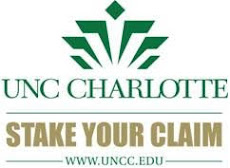By
Leanna Pough
In
a digital era, social media can be the tool to catapult your cause into the
minds of the masses.
By
using social media platforms like Facebook and Twitter, Alicia Garza, Patrisse
Cullors and Opal Tometi developed #BlackLivesMatter following the death of Travon Martin.
Its
creation started a national discussion on race relations in America.
 |
| Alicia Garza |
According
to its website, #BlackLivesMatter is an “online forum intended to build connections
between black people and allies to fight anti-black racism, to spark dialogue
among black people and to facilitate the types of connections necessary to
encourage social action and engagement.”
Garza, who spoke to a large and
diverse audience in UNC Charlotte’s Cone Center, McKnight Hall, dispelled
rumors and false truths surrounding the movement.
Here are a few takeaways from Monday
night’s talk:
1.
Social media doesn’t start movements, people do.
#BlackLivesMatter was born in a
context, as a call to action for African Americans. Its introduction followed
the February 2012 death of 17-year-old Trayvon Martin, who was shot and killed
while walking in his neighborhood. In 2013, Martin was put on trial for his own
death according to Garza. The shooter, George Zimmerman was acquitted per Florida's “Stand Your Ground” law
sparking outrage within black communities. Garza notes, during this
controversial time America had seen its first black president and record-setting
incarceration rates amongst African Americans. Her response, a love letter to
black people. Garza’s approach may be nuance, but she admits, her cause dates
back to 1619 when the
first African slaves reached Jamestown, Va.
Similar to the revolution surrounding Egypt’s Arab Spring, social media merely
brought context and light to long-standing issues. “Social media is a
tool.” Garza explained.
2.
#BlackLivesMatter isn’t a terrorist organization.
Often considered radical or compared
to revolutionary groups like the Black Panther Party, #BlackLivesMatter does
not advocate harm and shouldn’t be pigeon-holed into a specific type of
resistance. Garza explained, #BlackLivesMatter originated in love as a reminder
to blacks that they matter, they aren’t dysfunctional or required to be angels.
Her goal, to provide African Americans with something every human desires, to
be seen, to give the black community the voice and platform to be heard.
“All lives matter, but only the black ones are
being degraded,” Garza stated.
3.
Organize and start a conversation
Garza does not consider the
#BlackLivesMatter movement the new Martin Luther King Jr. or leader of the
people. #BlackLivesMatter is a fight for dignity and freedom whether it be
against state violence, police
brutality or social injustice. It’s a fight against profitable gains at
the expense of people of color.
“Blacks only account for 13 percent
of the population, we can’t exclude anyone,” Garza said.
Garza
currently serves on the board of directors for the School of Unity and
Liberation in Oakland, Calif. She has received numerous awards for her work in
the Black and Latino communities, including the Local Hero Award from the San
Francisco Bay Guardian and the Jeanne Gauna Communicate Justice award. She is a
two-time recipient of the Harvey Milk Democratic Club Bayard Rustin Community
Activist Award, too.
# # #
Leanna Pough is a UNC Charlotte alumna and communications coordinator in the Office of Public Relations & News Services.







